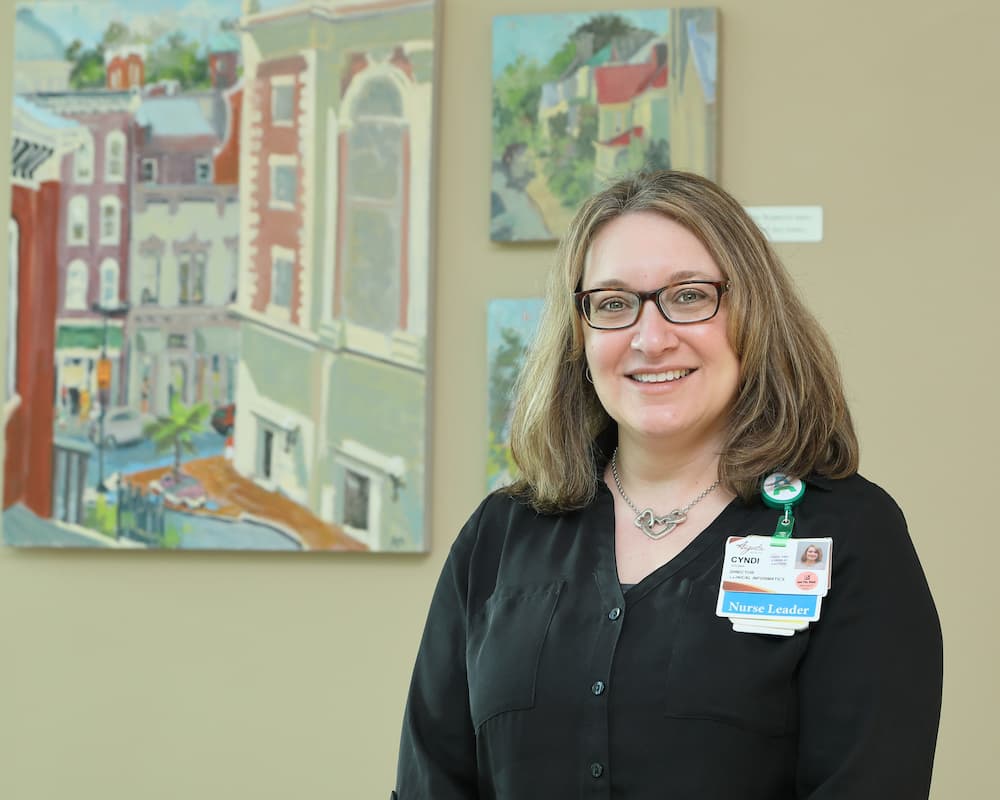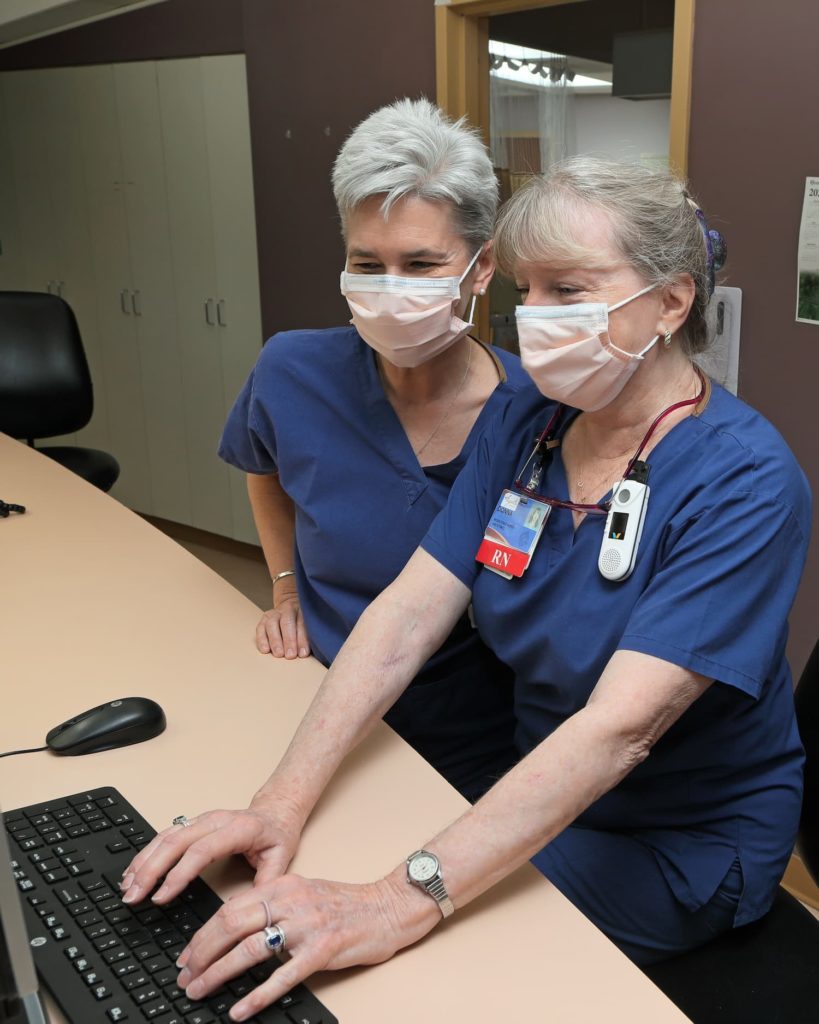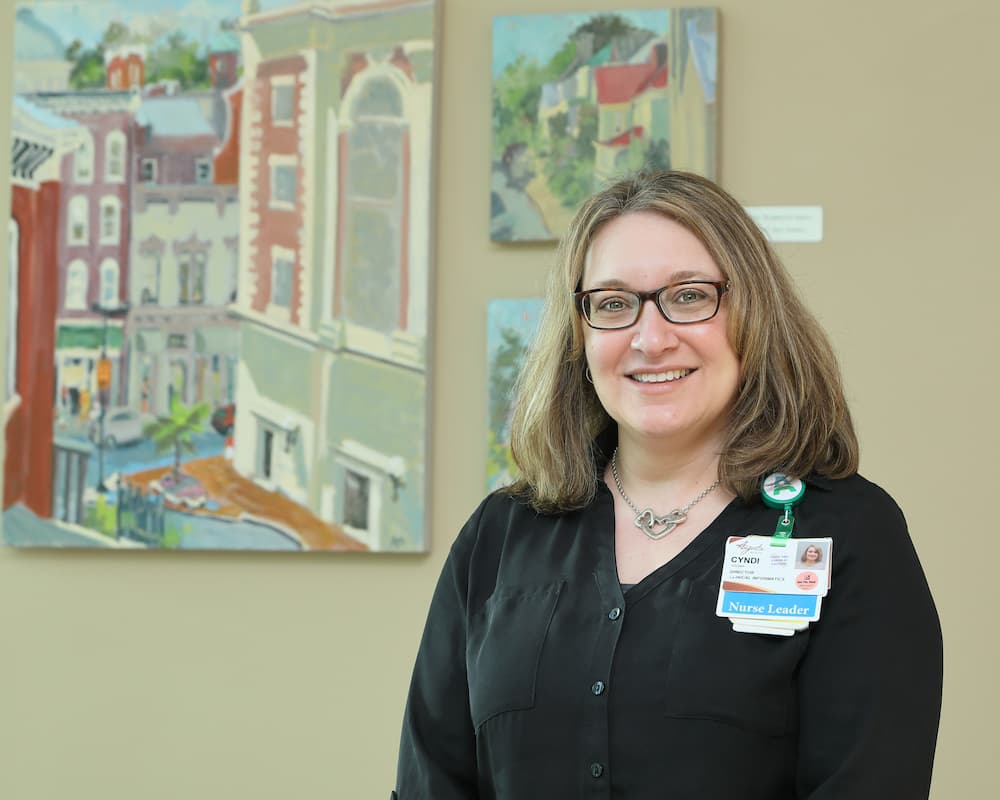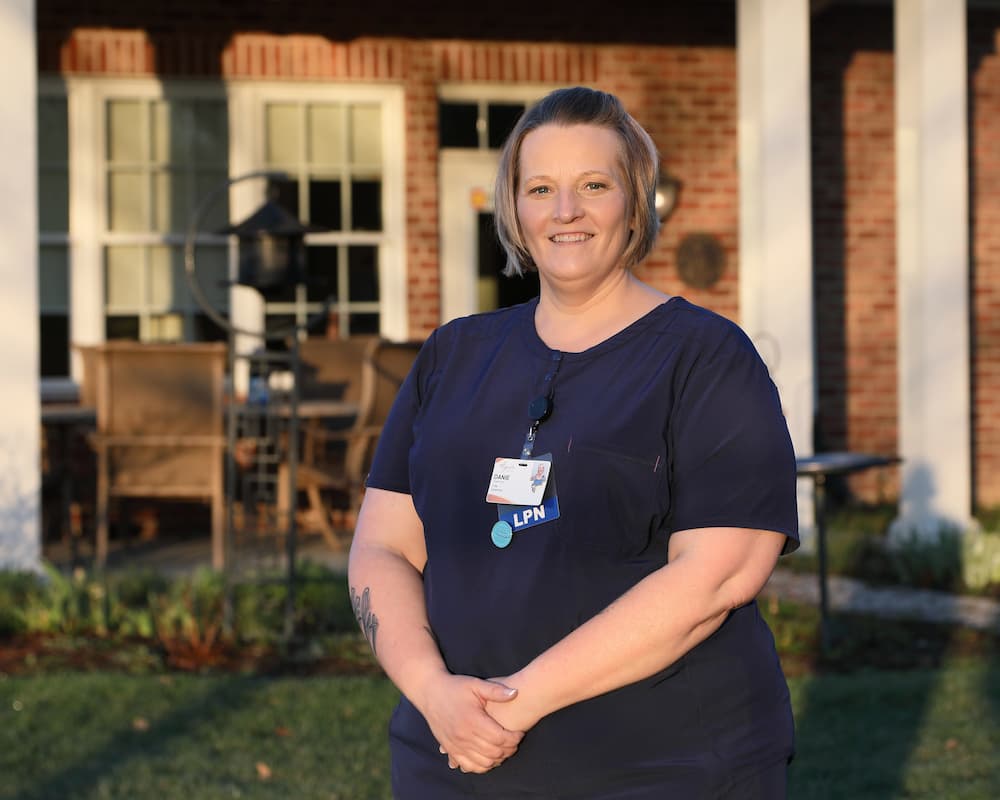A Salute to Nurses

Date: April 26, 2022
Categories: Health Focused
AUGUSTA HEALTH VALUES, SUPPORTS AND DEVELOPS THE REMARKABLE INDIVIDUALS WHO ARE ITS NURSES
The nation called nurses heroes in the early days of COVID-19. Augusta Health nurses would say otherwise. They would call themselves exceptional individuals with unique perspectives who share a common passion for caring for people—a family of choice rather than birth. In an environment both challenging and rewarding, they daily honor a legacy rooted in strength. They are leaders defining the next generation of healthcare; forerunners blazing non-traditional paths; and professionals building teams where everyone is valued. Here are three stories of Augusta Health nurses. There are hundreds more.

ROXANNE HARRIS MSN RN IBCLC CCE
Director, Obstetrics
Roxanne Harris likes to say she ‘came with the furniture and grew up at Augusta Health’. She began her career as an LPN at Kings’ Daughter’s Hospital in Staunton and after receiving an Associate’s Degree, began working as a labor and delivery nurse at Waynesboro Community Hospital. She assisted in the last delivery at Waynesboro when KDH and WCH merged and became Augusta Health.
She’s since earned her BSN, her International Board Certified Lactation Consultant, and her Master’s in Nursing—all with the encouragement and financial assistance from Augusta Health. Her role has grown, too—from a bedside nurse to charge nurse to lactation consultant/educator and, currently, as Director of Obstetrics.
“Becoming a leader by coming through the ranks is hard,” says Harris, “especially in an area like Obstetrics. As a delivery nurse, there’s a lot of tangible satisfaction. You are present at a very sacred and intimate moment in a family’s life. You see the look of gratitude and joy on a new mother’s face; you get the privilege of holding a new baby. It’s a huge gift you are given to be present at the birth of a family and to have this career as your life, it is something I am very grateful for.”
“As the leader, though, your focus changes from the bedside to the bigger picture, and there’s a lot of adjustment” she continues. “You’re now responsible for more strategic priorities and business-like challenges like hiring, budgets, purchasing equipment and the overall day to day operation of the unit. But then you learn the moments of gratitude and joy are still there, but in a different form. These moments come as you watch nurses grow both professionally and as people. The pride I feel for them when they have their “first successful anything” is amazing. There is joy for me when I watch them pass milestones in their educations, personal lives and professional goals. I’ve seen our team do amazing things, and I’m so proud of them. It’s been a huge leap to move into a leadership position, but I have felt that I am here for a reason. God has entrusted me with this family of nurses. They are more than nurses to me. I love each of them, and I love watching them grow.”
At the same time, Harris has discovered a new family of nurses—her peers who are nurse leaders and directors of other nursing departments. “Now, more than ever after what we’ve gone through together over the past two years, this is the group I lean into for support and encouragement for the leadership challenges, and I hope they all depend on me, too. These years have been hard, and we all had concerns and anxiety every time we had to make a decision, especially concerning safety issues. Our primary concern was to keep our team and our patients safe, but it was all uncharted territory for all of us. But we’ve been here for each other, just like family is for each other.”
Harris’ goal is now to focus forward and build for the future, to grow her department from a great Obstetrics Department to create the best Obstetrics Department with the best team working in it. But she never forgets the past. That last baby she delivered at WCH more than 25 years ago? She was able to celebrate with him in 2021 when his son was born at Augusta Health.
“I love nursing and I love the team on our unit,” she adds. “Nursing is a love and it’s a passion. But it’s hard—physically, mentally and emotionally. So you need to be a nurse for the right reason, or the paycheck will never be enough. But when it’s right, and even after a hard day, you get back up and keep going back because the rewards of being a nurse are immeasurable.”
As a young girl, Cyndi Solana always wanted to be a nurse. But as often happens, life interrupted her plans. She was living near Washington, DC, and took a job at an outpatient radiology diagnostic center to help defray college costs. As her career advanced there, she decided it would make sense to get a degree in Business Administration. She continued her career in healthcare, using her business degree.
“After a few years, though, I thought, ‘What the heck ever happened to nursing?’. So I went back to school and earned my Bachelor’s in Nursing from Georgetown University,” says Solana. “I was so happy to be able to pursue my true passion and first love.”

CYNDI SOLANA, MSN RN
Director, Clinical Informatics
Working as a nurse at the bedside further prepared her for the opportunities that were ahead–as did another opportunity. “I worked with another nurse to develop a core measure review program that helped our hospital achieve 100% compliance in three out of the four measures very quickly. That was huge,” she explains.
Then, while working as a clinical unit director at a hospital in Florida, she was asked to be the clinical lead for the implementation of their Computerized Provider Order Entry (CPOE) project. “It sparked my interest in informatics, and that quickly grew,” she adds. The CPOE project was time consuming, and it became clear that I couldn’t do both clinical leadership work and informatics at the same time. I chose to concentrate on the informatics.”
“Bedside nursing has become very high tech”, says Solana. “Technology now interfaces with just about everything nurses do. The medication dispensing machines, IV pumps, glucose monitors, vital sign monitors, and documentation are all electronic or electronically generated. My previous experience, along with knowing how to care for patients and remembering what it is like at the bedside are all big assets in my current work. I’m familiar with many sides of the equation we are typically trying to solve.”
A primary goal of Solana’s work is to improve processes and nurses’ workflows to make the work more efficient and provide a higher level of safety for the patients. She often helps to implement algorithms into the electronic medical record systems, based on evidence, to alert and guide the nurses’ awareness and to increase the accuracy of documentation and standardized care. Good examples are the sepsis alert screening intervention that guides the nurse if a sepsis alert should be initiated, post-medication administration best practice algorithms following the administration of specific drugs (such as tPA, a stroke clot-busting drug or something given for pain or aggressive behavior) as well as other interventions like those that identify the patient fall risk level or risk for pressure injuries.
Positively impacting the bedside workflow is always on Solana’s mind and two other examples of how technology and informatics has positively impacted the bedside nurse is the automatic upload of blood glucose results to the patient record and the use of Augusta Health’s mobile communication system to develop and implement a process that allows nurses to discreetly summon Security when faced with an unsafe situation.
Solana believes, that while her work is very different that that of the bedside nurse, it is a valuable non-traditional role. Her work has a significant impact on nurses—as well as other departments like pharmacy and therapies—throughout Augusta Health. “Right now, as many nurses have become exhausted from their work during the pandemic, it’s important to realize the opportunities within nursing are endless. There are many areas within the nursing profession such as informatics, quality and education where the experience of a bedside nurse can be used in a non-traditional role. I encourage anyone who is considering a move away from the bedside, instead of leaving the nursing profession completely to search out a new experience within it.”
Danie Armstrong didn’t always want to be a nurse, but she always knew she wanted to help people. Her first career was as a hair stylist, where she helped people look their best. When her life circumstances changed and she became a single mother, she began looking for a career that would provide stability for her family. Everyone said she’d be a good nurse, and circumstances led her to go to school to become a Licensed Practical Nurse (LPN).
“I loved it. I loved nursing,” says Armstrong, “and honestly, you have to love it, or you’ll never make it.”

DANIE ARMSTRONG, LPN
Shenandoah House, Hospice of the Shenandoah
Armstrong has worked in a medical office, in a dialysis center, in oncology and in a skilled nursing unit—but she has found her calling in Hospice and works at the Shenandoah House, a home-like environment for hospice patients who need general inpatient acute or respite care on the Augusta Health campus. “I really do love working in Hospice, but I like working in any unit as long as I’m with patients and their families.”
When the Shenandoah House closed during the early days of the pandemic, Armstrong was reassigned to the Progressive Care Unit and was a part of team nursing there. “With team nursing, and LPN pairs up with an RN, and we work together to do whatever needs to be done—as a team—to care for the patients. It’s a great ‘we are all in this together’ workflow and allows everyone to practice at their highest level,” Armstrong explains.
“I’ve had great opportunities at Augusta Health to use as many of my nursing skills as possible to care for patients. The Virginia scope of practice for LPNs is fairly broad, but you can sometimes be limited by the facility where you work. Here, I’ve been lucky because I’ve been able to work in many areas and gain experience in each of them. I’ve been blessed with a good team of colleagues and I have been encouraged to find my strengths and passions and maximize them. I’ve never been ‘boxed in’ and I’m so glad to be a part of bedside nursing. There is a lot you can do, especially if you seek the opportunities,” she says.
“I never believe that I—or any of my colleagues—am ‘just an LPN’. All levels of nursing are important,” Armstrong adds. “There is opportunity for LPNs out there, and especially here at Augusta Health, to practice as an LPN, to use your license to the fullest and to be a nurse. I encourage making it known that you like to be challenged, and that you want to hone and increase your skills and you’ll discover that the opportunities are there.”
“Nursing is a service profession and a labor of love, and I’m certain I’m a valuable part of it. We all do what we can where we can. There is a place for everyone in nursing.”
